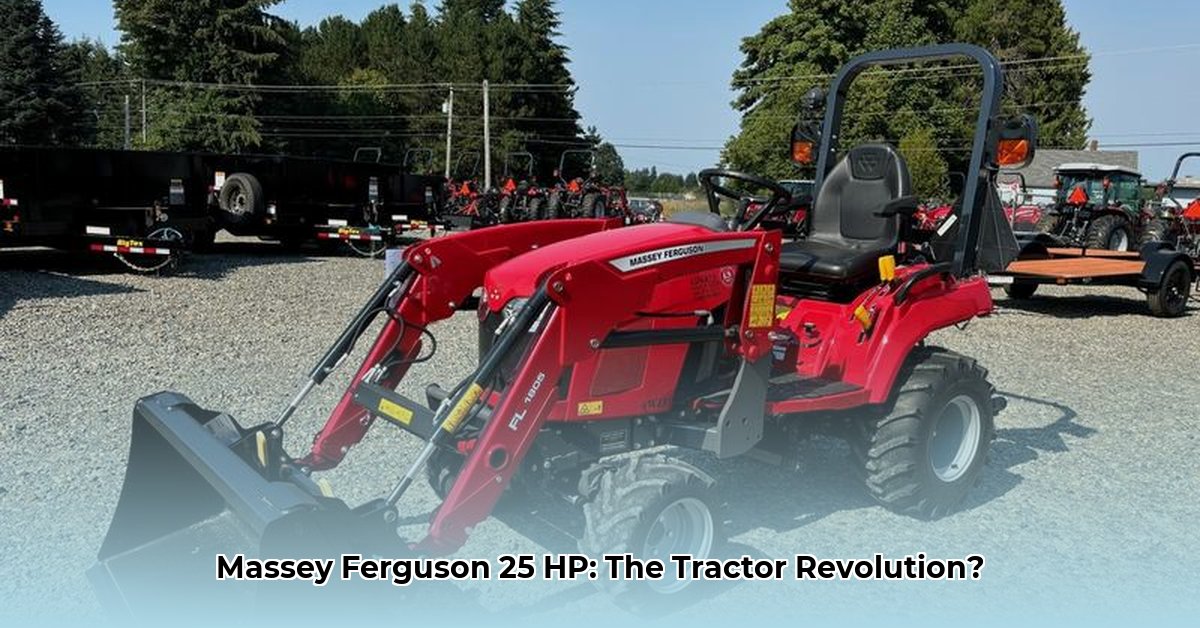
Massey Ferguson 25 HP Tractor: A Legacy of Dependability
The Massey Ferguson 25 HP tractor, a stalwart of mid-20th-century farming, represents a simpler era of agricultural machinery. Its strength lay in its robust, straightforward design, prioritizing durability and ease of maintenance above all else. This no-frills approach made it a reliable workhorse for countless farmers, its simplicity a testament to its effectiveness. Many farmers still fondly recall its dependability and the ease of maintenance it offered. But how does this classic model compare to modern offerings? For a detailed look at Massey Ferguson tractor history, check out this resource.
How did a simple, sturdy machine like the MF25 pave the way for the sophisticated compact tractors of today? What key improvements have been made?
The GC1700 Series: Modernizing Farm Work
Fast forward to the present, and the agricultural landscape has transformed. The Massey Ferguson GC1700 series embodies this shift, incorporating decades of technological advancements and farmer feedback. These tractors offer significantly enhanced operator comfort, featuring improved ergonomics and increased visibility, reducing fatigue and enhancing productivity. The increased versatility, provided by a wider range of compatible attachments, expands the capabilities beyond the MF25's more limited options. This leap forward in technology reflects a shift in priorities—from simple functionality to optimized efficiency and operator well-being. Isn't this a sign of progress?
Could superior ergonomics and improved visibility truly increase farm productivity by a significant margin?
A Detailed Comparison: MF25 vs. GC1700
While precise data comparing the MF25 and GC1700 across all metrics remains limited, some key distinctions are apparent. The following table summarizes the general differences, acknowledging that specific model variations within the GC1700 series will influence the final results.
| Feature | Massey Ferguson 25 HP Tractor | Massey Ferguson GC1700 Series |
|---|---|---|
| Simplicity | Very high | Relatively lower |
| Initial Cost | Generally lower | Generally higher |
| Operator Comfort | Basic | Significantly improved |
| Versatility | Limited; fewer attachment options | High; many diverse attachment options |
| Maintenance | Generally easier (simpler design) | Potentially more complex |
| Fuel Efficiency | Likely lower (older technology) | Likely higher (modern engine) |
It's important to note that these are broad generalizations. The condition and maintenance history of an MF25 will impact its actual performance, and variations exist within the GC1700 series.
Choosing the Right Tractor for Your Needs: A Practical Guide
Selecting the appropriate tractor involves careful consideration of multiple factors. Here's a step-by-step guide:
- Assess Your Farming Operations: Identify your primary tasks, acreage, and budget, encompassing both the initial purchase and ongoing maintenance costs. A comprehensive evaluation of your workload is vital.
- Conduct Thorough Research: Explore reviews, discuss experiences with other farmers, and utilize online forums dedicated to Massey Ferguson equipment for valuable insights. This additional research will lead to a better-informed decision.
- Consider a Test Drive (If Possible): Hands-on experience is crucial to gauge comfort, maneuverability, and overall feel. A test drive allows for a realistic evaluation of the tractor’s suitability.
- Seek Expert Advice: Consult experienced mechanics and agricultural equipment dealers for professional guidance. Their expertise significantly assists with informed decision-making.
- Plan for Long-Term Ownership: Consider the tractor's lifespan, potential resale value, and total cost of ownership over its operational life.
The decision between an MF25 and a GC1700 is not solely about horsepower; it's about aligning your needs with the available technology and comfort features. The ideal tractor is the one that best supports your farm's operation for years to come. While the MF25 represents a significant piece of agricultural history, the GC1700 underscores the continuous evolution of farm machinery, prioritizing both effectiveness and operator well-being.
Fuel Efficiency: A Comparative Analysis
While precise fuel efficiency data directly comparing the MF25 and GC1700 is scarce, analyzing the factors contributing to fuel consumption helps inform a comparative assessment. Fuel efficiency isn't just about gallons per hour; it also considers the work accomplished per gallon consumed.
Key Takeaways:
- Direct fuel efficiency comparison between the MF25 and GC1700 is challenging due to data limitations.
- Both tractors cater to differing user needs and workloads, impacting fuel consumption.
- Operational factors, such as workload and terrain, significantly influence fuel use.
- Real-world fuel consumption often deviates from manufacturer-provided estimates.
The GC1700's modern engine design may offer improved fuel efficiency compared to the older MF25, but this is an assumption not firmly supported by substantial data. Improved hydraulic systems in the GC1700, however, likely contribute to less wasted power and thus more efficient operation. Therefore, a thorough assessment of real-world fuel consumption by similar users performing comparable tasks would be required to draw accurate conclusions. Instead of singular focus on fuel consumption, a broader analysis considering the overall operational costs—including fuel, maintenance, repairs and time savings—is recommended.